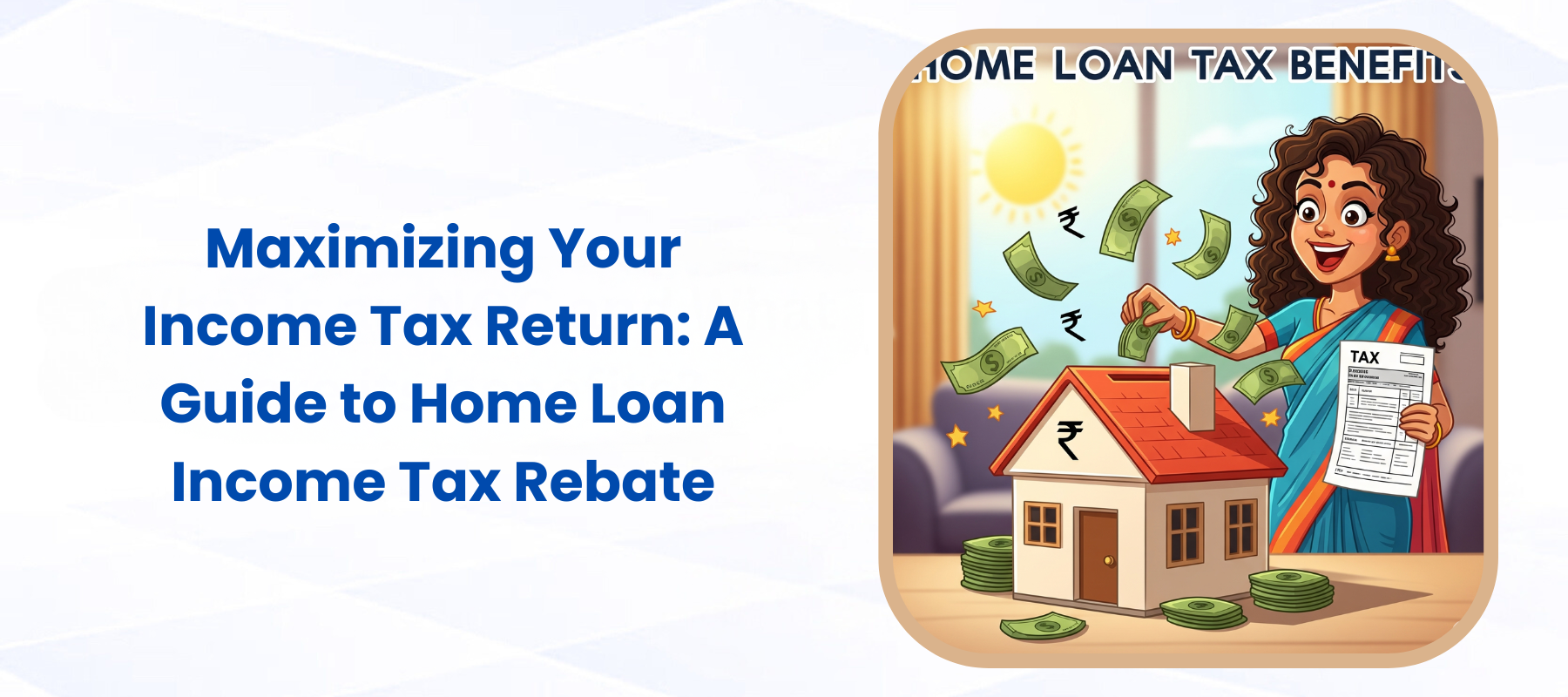Special Offers




Special Offers




27-Jun-2025 | Home Loan

This blog will guide you through the various income tax rebates available under the Income Tax Act, especially for home loan borrowers. You’ll learn how to file income tax returns, claim deductions, and make the most of your home loan interest rebate in income tax.
Income tax filing (also known as e-filing of income tax) is mandatory for most salaried and self-employed individuals. But for home loan borrowers, ITR filing has added importance. Here’s why:
● It helps in claiming home loan income tax rebates.
● Serves as proof of income for future loan applications.
● Enables hassle-free financial planning and refund claims.
● Acts as legal documentation of your income sources and expenses, including loan repayments.
So, whether you’re new to filing income tax returns or a seasoned taxpayer, understanding the tax advantages of a home loan can make a big difference.
Home loan tax benefits are mainly divided under the following sections:
● What is it? You can claim a deduction of up to ₹1.5 lakh per year for the principal portion of your home loan EMI under Section 80C.
● Eligibility: The home loan must be for the purchase or construction of a residential property.
● Conditions:
○ The property should not be sold within 5 years of possession.
○ The loan must be from a recognized financial institution.
● Documents Required:
○ Loan repayment certificate from your lender.
○ Proof of registration and ownership.
Note: This deduction is part of the overall ₹1.5 lakh limit under 80C, which includes investments like EPF, PPF, ELSS, etc.
● What is it? This section offers a home loan interest income tax rebate of up to ₹2 lakh per year on the interest portion of your home loan EMI.
● Eligibility: The loan should be taken for purchase, construction, or renovation of a residential property.
● Conditions:
○ Construction must be completed within 5 years.
○ The property must be self-occupied.
● Documents Required:
○ Interest certificate from the lender.
○ Completion certificate or possession letter.
Pro Tip: For let-out properties, there is no upper cap of ₹2 lakh. You can claim the entire interest amount paid, though the overall loss from house property that can be adjusted against other income is capped at ₹2 lakh.
● Deduction Amount: Additional deduction of up to ₹50,000.
● Eligibility Criteria:
○ Loan amount should not exceed ₹35 lakh.
○ Property value should not exceed ₹50 lakh.
○ Loan must be sanctioned between 1st April 2016 and 31st March 2017.
○ You must be a first-time homebuyer.
● Documents Required:
○ Declaration that you do not own any other house.
○ Sanction letter and repayment schedule.
● Deduction Amount: Additional deduction of ₹1.5 lakh on interest paid.
● Eligibility:
○ Stamp duty value of the property should not exceed ₹45 lakh.
○ The loan should be sanctioned between 1st April 2019 and 31st March 2022.
○ You must not be claiming benefits under 80EE.
● Documents:
○ Loan sanction letter.
○ Interest certificate from lender.
○ Property documents showing stamp duty value.
These sections combined can help you claim up to ₹3.5 lakh or more as house loan income tax rebate in a financial year.
If your total income is less than ₹5 lakh in a financial year, you can claim an income tax rebate under section 87A of up to ₹12,500. This can completely offset your tax liability.
This rebate can be availed in addition to your housing loan interest rebate in income tax and deductions under 80C.
If you're wondering how to declare home loan in income tax, here’s a step-by-step guide:
Log in to the Income Tax portal and start your e-filing of income tax return.
Under the "Income Details" tab, select "Income from House Property".
Fill in the property details (self-occupied or let-out).
Enter the interest paid and principal repaid figures.
Submit supporting documents, if required.
Finish the ITR income tax return form and verify it.
By following this process, you can file an income tax return online with all your home loan income tax rebate details accurately declared.
When filing your ITR return to claim housing loan rebate in income tax, make sure to keep the following ready:
● Home loan interest certificate
● Principal repayment proof
● Loan sanction letter
● Property documents
● PAN card, Aadhaar, Form 16 (for salaried), or financials (for self-employed)
Under the new tax regime, home loan income tax rebate (like deductions under 80C and 24b) is not available. If you're repaying a home loan, the old regime is generally more beneficial due to the variety of deductions it offers.
Check your income tax return computation under both regimes before deciding. Know More: Home loan Tax benefits in 2025
Understanding and leveraging home loan income tax rebate can lead to significant savings. Whether it’s the principal deduction under Section 80C, interest deduction under Section 24(b), or extra reliefs under 80EE and 80EEA, these benefits can ease your financial burden and optimize your tax savings.
Don’t forget to file income tax return on time to claim these benefits. And if you're unsure, consult a tax expert or use reliable platforms for e filing of income tax.
With the right knowledge and timely action, your income tax return can be a powerful tool for financial growth, especially when you're investing in your dream home.